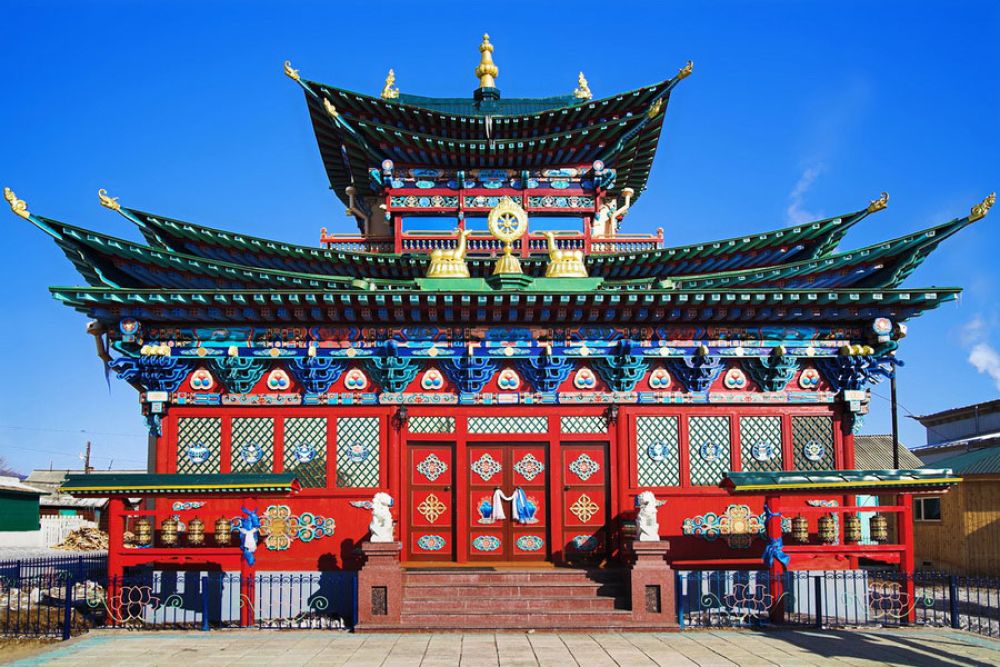

The food culture of Ulan-Ude, the capital of the Republic of Buryatia in Russia, is deeply influenced by the indigenous Buryat peoples, Russian settlers, and the Mongolian heritage. Historically, the Buryats were nomadic herders who relied heavily on animal products, such as milk, meat, and blood, which were obtained without killing the animal, to sustain themselves through harsh winters. Dumplings, soups, and pastries have been central to the Buryat cuisine, bearing similarities to other Asian culinary traditions.
The Buddhist and Mongol influences have introduced unique flavors and methods of preparation to the region's meals. However, the Russian presence has also brought with it dishes from Slavic traditions, which, over time, have melded into the unique East Siberian gastronomy known today.
These are traditional Buryat dumplings usually filled with minced meat, often lamb or pork (excluding beef), seasoned with onion, garlic, and salt, and then steamed. They are similar to Mongolian buuz and are typically eaten by hand, with etiquette requiring the consumer not to cut into them with any utensil.
Pozy are essentially the same as buuza, but they are prepared predominantly in the Buryat style. The filling might also include meat, but avoiding the cow, and they are enjoyed with a variety of sauces and broths.
Okroshka is a cold soup made with kvass (a traditional Slavic and Baltic fermented beverage) mixed with chopped vegetables like cucumber, radishes, and spring onions, often with the addition of hard-boiled eggs and a dollop of sour cream for a refreshing taste.
This soup is made from sour cabbage similar to sauerkraut, and packed with rich flavors it includes various vegetables like potatoes, carrots, and onions. It's a staple during the cold Siberian months.
A thick, spicy, and sour Russian soup that mainly contains fish or various smoked meats (pork or other meats except cow), pickles, capers, and olives. It's heavily seasoned and offers a complex array of flavors.
Omul, a fish endemic to Lake Baikal, can be found in the markets of Ulan-Ude. It is often smoked or salted and eaten as an appetizer or main course.
Similar to crepes, these pancakes are thinner and can be served with a variety of fillings or toppings, such as jam, cream, or condensed milk.
These are fried flat dumplings filled with minced meat, usually mutton or pork, with onion and garlic, offering a crispy counterpart to the steamed pozy.
A traditional beverage consumed in Buryatia, it's a salty milk tea that exhibits Asian influences and is sometimes enriched with butter or fat to provide extra sustenance.
Siberian pelmeni are traditional Russian dumplings, filled with minced pork and other meats, wrapped in a thin, unleavened dough and boiled.
Address: Ulitsa Smolina, 54, Ulan-Ude, Buryatia, Russia
Famous Dish: Buuza (Non-Veg)
Address: Ulitsa Ranzhurova, 3, Ulan-Ude, Buryatia, Russia
Famous Dish: Pozy (Non-Veg)
Address: Ulitsa Profsoyuznaya, 47, Ulan-Ude, Buryatia, Russia
Famous Dish: Siberian Pelmeni (Non-Veg)
Address: Ulitsa Lenina, 47, Ulan-Ude, Buryatia, Russia
Famous Dish: Varieties of Pasta (Veg options available)